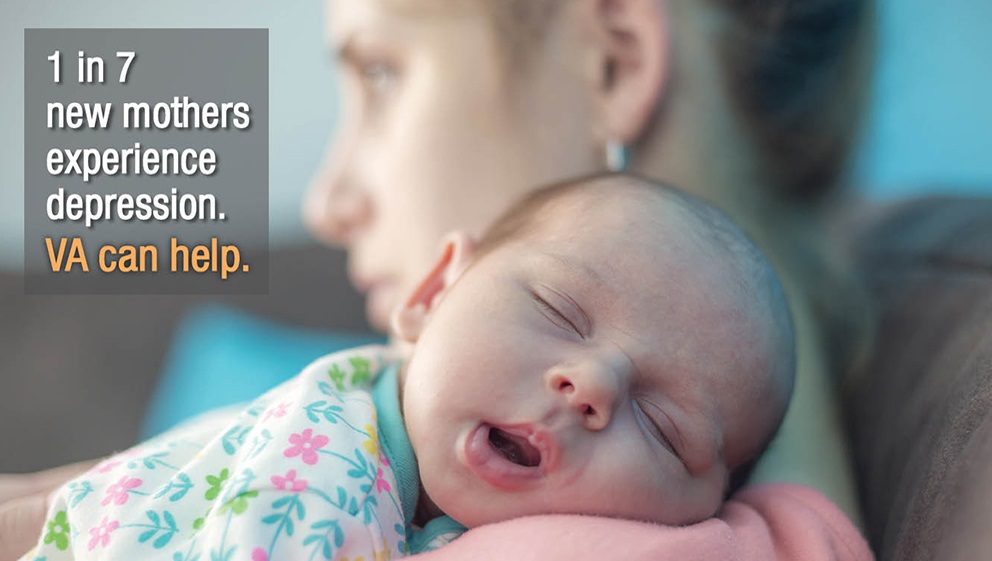The birth of a baby is a life-changing event that can trigger all kinds of emotions from happiness and joy to jitters and fear. It can also lead to something you might not expect — postpartum depression.
Postpartum depression — a depression that occurs after having a baby — is the most common complication of giving birth. It affects one in seven new mothers. Left untreated, postpartum depression can have long-lasting negative results, harming the health of new mothers, their babies, and their families.
It could be the “baby blues” or it could be postpartum depression.
After giving birth, many women have the “baby blues,” which are feelings of worry, sadness, and tiredness that usually last a few days. Symptoms of postpartum depression are like those of “baby blues,” however, postpartum depression symptoms are more intense and can last for many months.
Are you at risk for postpartum depression?
Women Veterans commonly suffer from depression, anxiety, and posttraumatic stress disorder after military service. Veterans who become pregnant have an increased likelihood of having a mental health issue, which puts them at a higher risk for postpartum depression. With more women serving in the military than ever before, it is important to support women Veterans by providing information and treatment options.
Postpartum depression is not your fault.
Postpartum depression is never anyone’s fault. Pregnancy, childbirth, and caring for a child can be a challenge for all parents, physically and mentally. Postpartum depression affects more than half a million American women each year and can affect any woman who becomes pregnant — women with easy pregnancies or difficult pregnancies, first-time moms and mothers with one or more children, women who are married and women who are not, and women of any age, race, ethnicity, culture, education, or income.
Only about 15 percent of women who suffer from postpartum depression receive professional care. There are many reasons that women do not seek treatment, including misdiagnosis, denial, and lack of access to care.
Know the symptoms.
Postpartum depression can begin anytime within the first year after giving birth. Signs you have postpartum depression may include extended periods (two weeks or more) of:
- Feeling sad, down, or depressed
- Losing interest in what you usually enjoy
- Difficulty in thinking or decision making
- Loss of appetite
- Loss of energy
- Frequently thinking about death or suicide
If you think you may have postpartum depression, seek help.
VA and Women’s Health Services offers many care options to help you get treatment for postpartum depression:
MomMoodBooster. A free online program designed to help women Vets recover from postpartum depression. Women complete six sessions and receive calls from a phone coach.
Make The Connection. Kim, an Air Force Veteran, shares her experience with postpartum depression that went undiagnosed for years.
Women Veterans Call Center. Chat online or call 1-855-VA-WOMEN (1-855-829-6636) Monday through Saturday to get help about VA benefits and services, including postpartum depression treatment.
Veterans Crisis Line. Chat online, send a text to 838255, or call 1-800-273-8255 and Press 1 to receive confidential support 24 hours a day, 7 days a week, 365 days a year.
VA Medical Centers Seek therapy and treatment options tailored to women Veterans’ needs.
Maternal Mental Health. Seek postpartum support during pregnancy AND postpartum. Online resources are available or call 1-800-944-4PPD (4773).
About the author: Dr. Alicia Christy is the Deputy Director of Reproductive Health at the Veterans Health Administration
Topics in this story
More Stories
Bob Jesse Award celebrates the achievements of a VA employee and a team or department that exemplifies innovative practices within VA.
This month's Center for Women Veterans Book Corner author is Navy Veteran Kimberly Henry, who served as a Cryptologic Technician and Sexual Assault Victim Advocate from 2009-2019. She created "Warrior's Path to Healing: A 12-Week Empowerment Journal for Women Veterans."
The Medical Foster Home program offers Veterans an alternative to nursing homes.






